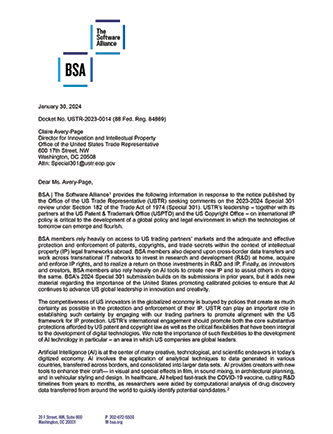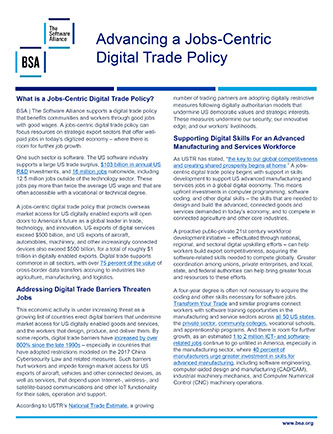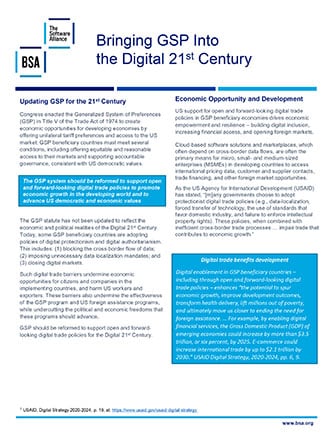Forward-looking digital trade rules are key to job creation, economic competitiveness, and technological innovation in software, artificial intelligence, smart devices and other emerging technologies. Companies of all sizes and across all sectors — from agriculture and manufacturing to financial services and healthcare — rely on the ability to move data across borders and on smart digital trade policies suited to today’s innovation ecosystem. However, increasingly, some countries are turning to protectionist measures – often disguised as privacy or security restrictions – to hinder international data flows and the ability of foreign firms to conduct business abroad. As a result, an important priority for BSA is promoting international trade by eliminating barriers to global data transfers and securing strong digital trade provisions in bilateral and multilateral consultations.
Digital Trade
BSA advocates for smart, modern trade agreements that include 21st century obligations that drive job creation, competitiveness, and innovation. A modern trade agreement must ensure the ability of companies to transfer data across borders, prohibit data localization requirements, protect innovation, support digital government procurement, and foster digital security. BSA advances these and other digital trade priorities by engaging directly with governments around the world on bilateral and multilateral trade discussions.
Investment and Export Controls
Emerging technologies are reshaping the way we interact with the world, transact business, and deliver government services. At times, these technologies may also implicate core national security interests. Governments have a legitimate interest in reviewing investments and controlling exports of technologies when such transactions threaten national security. At the same time, encouraging continued innovation and maintaining leadership in the development of these emerging technologies is crucial to protecting national security. BSA therefore engages with governments to help shape the development of investment and export controls to ensure they are narrowly tailored to address legitimate national security concerns and avoid unintended consequences that may undermine the competitiveness of innovative industries.
Special 301
The US Trade Representative is required by law to issue annually determinations of “those foreign countries that deny adequate and effective protection of intellectual property rights, or deny fair and equitable market access to United States persons that rely upon intellectual property protection.” (Section 182 of the Trade Act of 1974, as amended by the Omnibus Trade and Competitiveness Act of 1988 and the Uruguay Round Agreements Act (19 U.S.C. § 2242)).
The global software industry, including BSA members, face an increasingly complex and more difficult trade and economic environment, with many countries erecting barriers to emerging business models, such as cross-border data services, that will drive the 21st century economy.
BSA’s submission focuses on two sets of issues: the unacceptable and highly disruptive barriers to market access our members encounter; and the staggering amount of unlicensed software used globally, estimated at over US$52 billion in 2015 (see BSA’s Global Software Survey).














